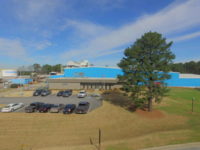Chairman of Saint-Gobain to Participate in Climate Week 2021

NEW YORK — The chairman of Saint-Gobain Pierre-André de Chalendar and author of "The Urban Challenge, Reviving the Desire of Live in the City" (Odile Jacob) will participate in Climate Week New York City with a message to deliver: “to win the battle against climate change, we need to rethink and transform our cities.”
Pierre-André de Chalendar will participate in closed-door sessions at The Climate Group and will speak at 10 a.m. on Sept. 22 at a Climate Week NYC virtual panel discussion organized by Climate Finance Advisors (CFA), a U.S.-based consulting firm. The CFA event, entitled "Financing Urban Livability and Climate Solutions: Vision and Opportunity," is open to the public.
The recent flooding of the subway systems and personal damages in New York City after Tropical Storm Henri and the remnants of Hurricane Ida poured deadly and record amounts of rain. Streets morphed into rivers, subways into falls, and basements into lakes. These two meteorologic events are a glimpse of what could happen to many cities in the future if carbon emissions remain the same as they are today.
“Cities are actually at the epicenter of our fight against climate change,” said de Chalendar. “They are the key to our future: their population should grow from 4 billion people today to 6.5 billion by 2050; they produce 70% of carbon emissions; and climate change could very well lead to immense damages, loss of lives, and population migrations.”
In addition, the pandemic has revealed that cities were no longer as attractive as they used to be, yet there is no alternative to urban centers. With that in mind, the first challenge is to reduce the energy buildings consume.
“Recent innovations allow us to retrofit old buildings or to build anew with materials and solutions that will reduce to almost zero the energetic need to heat or cool down habitats and workplaces,” de Chalendar said.
The second challenge is to rethink urban environments to lower our need for mobility drastically.
“While there does not seem to be ‘one model fits all,’ scientists, urban planners, and architects have come up with proposals to ‘live the city differently,’ with fewer cars and long commutes,” de Chalendar said.
Finally, the overall challenge is, in Chalendar’s own words, "to revive the desire to live in the city," as it used to exist when the oldest-known city, Uruk, was formed 5,000 years B.C.
“Rethinking our built environment and need for mobility would not only help us change the course of climate change, but it will also enhance our wellbeing and pleasure to live in a city.”
Looking for a reprint of this article?
From high-res PDFs to custom plaques, order your copy today!





